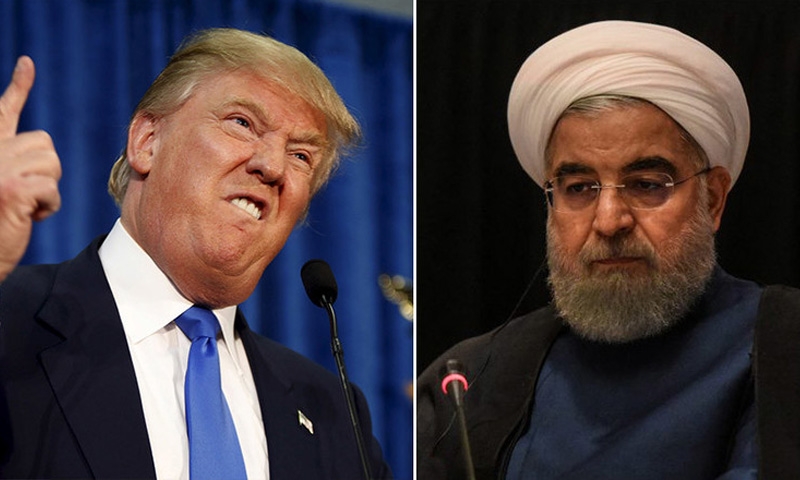Trump is not tough enough on Iran
Sometimes the world’s media resembles a giant echo chamber. A high proportion of the liberal media is consumed by endless criticism of President Donald Trump’s divisive policies — often justifiably. So with Trump reimposing sanctions on Tehran, this vast media machine has steamrolled ahead, thoughtlessly denouncing Trump’s “tough” position against Iran. We are treated to TV debate shows without any debate: Participants simply take turns repetitively and tediously arguing that the nuclear deal seemed to be working fine, and “Trump’s approach will only undermine Iran’s moderates.”
Meanwhile — instead of working with America to create a workable successor deal — Europe is vigorously trying to appease Tehran and subvert US efforts, dreaming up a bizarre framework for conferring anti-sanctions protection for Western firms who have mostly been smart enough to interpret the wind direction and exit the Iranian economy as fast as possible.
The fundamental problem is what the nuclear deal didn’t cover: Namely, the ballistic programme, the long-term future of Iran’s nuclear programme, and the unleashing of paramilitary hordes across the region to sabotage the governing systems of Middle Eastern states. Why is the latter point consistently ignored by the Western media?
Iran’s paramilitary proxies strategy is arguably an outgrowth of Western pressure on the nuclear program. During the 1980s, revolutionary Iran bankrolled paramilitary forces almost literally everywhere: Lebanon, Saudi Arabia, Bahrain, Iraq, Kuwait, etc. However, after Ayatollah Ruhollah Khomeini’s death, it was the “pragmatists” – Ali Khamenei and Akbar Hashemi Rafsanjani — who curtailed this activity, allowing Iran to rebuild after the catastrophic war with Iraq.
We now know that Supreme Leader Khamenei, the “pragmatist,” spent the 1990s quietly pursuing breakout nuclear capacity so Tehran could menace its enemies — America, Israel, Europe, and the Gulf Cooperation Council states — with nuclear holocaust. When this program was discovered in 2003, Khamenei was forced to shelve his frenzied ambitions for nuclear apocalypse. So, in order to retain his warmongering abilities, Khamenei dusted off Khomeini’s revolutionary blueprint for a transnational proxy army of brainwashed militants based on the hugely successful model of Hezbollah, which today outguns the Lebanese state itself.
Within a couple of years, Khamenei’s lieutenant, Gen. Qassem Soleimani, had armed and trained Iraqi Shiite militants for staging thousands of attacks against American, British and Iraqi forces, causing hundreds of fatalities. Then came the Syrian uprising, where around 60,000 proxies have retained Bashar Assad in power as an Iranian puppet. Iran, likewise, armed various parties in Afghanistan, while cashing in on the lucrative opium trade. In Yemen, Houthi terrorists rain down Iranian missiles upon Saudi Arabia and menace the globally crucial Bab Al Mandab Strait. Iran, meanwhile, has sought to exacerbate religious and political tensions throughout the Middle East and North Africa, while its arms smuggling networks penetrated deep into the African continent.
Sanctions are necessary. Yet, despite the accumulation of international sanctions after 2005, Iran’s paramilitary spending similarly mushroomed; partly because the Islamic Revolutionary Guard Corps filled its coffers through monopolizing sanctions-evading networks in oil, heavy arms, narcotics and basic goods. The IRGC reinforced its stranglehold on the economy while ordinary Iranians suffered.
During the 1980s, the Western media portrayed Khomeini as a deranged, bloodthirsty demagogue, while Khamenei was widely viewed as a pragmatic voice of reason. Today we have Hassan Rouhani and Mohammed Javad Zarif providing the “reformist” facade. Yet, from the earliest days of the revolution, Rouhani, alongside Khamenei, was a quintessential regime insider. Instead of meeting America halfway, Rouhani is today escalating his anti-Western rhetoric and winning plaudits from Soleimani and Khamenei.
What would be the point of negotiating with Rouhani, when the so-called president isn’t sufficiently senior to be properly briefed about Khamenei and Soleimani’s bellicose regional strategy? The presidency is a smiling facade for a repressive and hated terrorist regime. Let’s not kid ourselves.
By trying to honor a deal that is already dead, Europe is undermining any hope of a holistic and enforceable containment program against Iran. Meanwhile, China, Russia and India will happily circumvent American efforts and provide Iran’s economy with back-door funds.
Yet Trump himself lacks a coherent Iran containment strategy. I doubt he clearly understands who the Hezbollah Brigades, Asa’ib Ahl Al Haq and the Houthis are, despite these factions threatening to attack American assets. Nevertheless, some officials driving Trump’s policies comprehend Iranian meddling all too well. Defence Secretary James Mattis was on the ground in Iraq when US troops were being slaughtered by Iranian munitions. Mattis spent the past decade having his stark warnings of Iranian aggression being completely ignored by the Obama administration.
Sanctions ratchet up the pressure, but they are a blunt instrument that often produce perverse results — not least enriching the IRGC and paramilitary factions. If Trump has the stomach for confronting this militia menace, he must stop hinting about quitting Syria and block their further expansion, while working with allies to ensure that militants cannot dominate Iraq’s forthcoming government. He must assist the GCC coalition in halting Iran’s pipeline of heavy munitions to the Houthis. Trump likes quick, easy wins — but there is no cheap win against Iran. Tehran is patient, tenacious and single-minded in building up its war-making assets across the region, until one day we wake up and it is the sole dominant force on the field.
Instead of castigating Trump for being mean to nice Mr Rouhani, the world’s media must take a hard look at what Iran is actually doing — and then criticize Trump for not going far enough in devising an all-encompassing strategy to stop Tehran in its tracks. Only this can prevent the Arabian Gulf, the Red Sea and the Eastern Mediterranean from becoming Iranian zones of control, from which Iran can menace the global economy — with equally catastrophic consequences to the ayatollahs having been allowed to possess a nuclear bomb in the first place.
(Baria Alamuddin is an award-winning journalist and broadcaster in the Middle East and the UK.)
Related Posts

